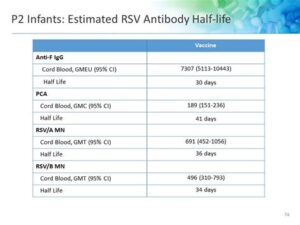Explore the benefits and safety of co-administering flu and RSV vaccines, their impact on the immune system, and expert recommendations for optimal effectiveness.As the cold and flu season approaches, many are left wondering about the best ways to protect themselves and their loved ones against respiratory illnesses. With both the flu and respiratory syncytial virus (RSV) posing significant health risks, the idea of receiving these vaccines simultaneously has garnered increasing attention. This blog post will delve into the intricacies of co-administration, exploring the latest research on the flu and RSV vaccines, their effects on the immune system, and the safety of receiving them at the same time. We’ll also discuss the potential effectiveness of this approach and offer expert recommendations on navigating vaccination options. Whether you’re a healthcare provider or someone eager to stay informed about the latest in preventive care, this guide will equip you with valuable insights as we prepare to face the season ahead.
Flu and RSV vaccines
As the cold and flu seasons approach, the importance of vaccination becomes even more pronounced. Among the key vaccines to consider are the Flu and RSV (Respiratory Syncytial Virus) vaccines. These vaccines offer a critical line of defense against viral infections that can lead to significant health complications, particularly in vulnerable populations such as the elderly and young children.
Recent studies have demonstrated that the simultaneous administration of the Flu and RSV vaccines is not only safe but also effective. This co-administration can increase vaccine uptake, thereby providing broader protection during peak virus circulation periods. By opting for both vaccines at the same time, individuals can streamline their immunization process without compromising safety or efficacy.
Healthcare providers often recommend co-administration, especially for those at high risk of complications from these viruses. The ability to receive these vaccinations in one visit can help encourage higher vaccination rates, which is crucial for public health, especially in community settings.
Impact on immune system
The introduction of flu and RSV vaccines into public health programs has led to significant discussions regarding their impact on the immune system. Understanding how these vaccines interact with our immune defenses is crucial for health professionals and the general public alike.
Research indicates that administering the flu vaccine alongside the RSV vaccine can elicit robust immune responses. The body’s immune system is designed to recognize and respond to multiple antigens at once, leading to enhanced protection.
- Immune Memory: Vaccines work by creating a memory in the immune system, ensuring a faster and more efficient response to future infections.
- Antigen Presentation: Co-administration may improve the presentation of antigens to immune cells, optimizing the immune response.
- Cross-Protective Effects: There is evidence to suggest that exposure to different vaccine strains can boost overall immunity.
However, while studies generally show positive outcomes, it’s essential to monitor individual responses closely. Factors such as age, underlying health conditions, and timing of vaccinations p
Safety of simultaneous vaccination
As the medical community continues to adapt to emerging health challenges, safety of simultaneous vaccination has become a topic of significant interest and research. Vaccines play a crucial role in enhancing immunity against various pathogens, and when considering vaccines like the flu and RSV (Respiratory Syncytial Virus), understanding their co-administration is critical.
Numerous studies have documented that receiving the flu and RSV vaccines at the same time is generally safe for most individuals. The Centers for Disease Control and Prevention (CDC) and other health organizations emphasize that simultaneous vaccination does not compromise the effectiveness of either vaccine. In fact, this dual vaccination strategy can be more convenient for patients, reducing the number of healthcare visits required.
Common concerns revolve around the potential for increased side effects when receiving multiple vaccines concurrently. However, clinical data show that the side effects tend to be similar to those experienced when receiving each vaccine separately. Most individuals may experience mild reactions such as soreness at the injection site or temporary fever, which typically resolve within a few days.
| Vaccine | Common Side Effects |
|---|---|
| Flu Vaccine | Soreness, fever, muscle aches |
| RSV Vaccine | Soreness, mild fever, fatigue |
In conclusion, the evidence supports the safety of co-administration of vaccines, thereby helping to bolster immunity against both influenza and RSV. As vaccination efforts continue globally, it’s imperative to encourage public awareness about the benefits and safety of simultaneous vaccinations.
Potential effectiveness
The effectiveness of receiving the flu and RSV vaccines simultaneously has been a topic of growing interest among healthcare professionals. With the onslaught of respiratory viruses, understanding how these vaccines can work together is crucial for public health.
Studies indicate that co-administration of the flu and RSV vaccines does not compromise the individual effectiveness of each vaccine. In fact, getting both vaccines at the same time can lead to increased vaccinations within the community, promoting herd immunity. This is particularly important during flu season, where the potential for outbreaks of both viruses increases.
Moreover, simultaneous vaccination may also enhance the immune response by reducing the overall antigen load and exposing the immune system to multiple viral targets in a shorter timeframe. This strategy can be especially beneficial for high-risk populations, such as the elderly and those with underlying health conditions, ensuring they receive protection against the most prevalent respiratory pathogens.
Recommendations for co-administration
When considering the co-administration of the flu and RSV vaccines, public health authorities recommend several best practices to ensure optimal outcomes. These guidelines emphasize the importance of receiving both vaccines to enhance protection against respiratory illnesses, particularly during the flu season.
- Consult Healthcare Providers: Always discuss vaccination options with a healthcare professional to assess personal health conditions and vaccine history.
- Timing of Vaccines: It is generally safe to receive flu and RSV vaccines during the same visit. Health professionals may provide the vaccinations in separate limbs if feasible.
- Monitor for Reactions: Patients should observe their health for any potential adverse effects following simultaneous vaccination and report them to their doctor.
The advisory on co-administration also encourages healthcare providers to maintain comprehensive vaccination records, ensuring that both vaccines have been administered appropriately. This is crucial for effective tracking and management of immunization schedules.
Additionally, it is wise to stay informed about the evolving guidelines related to the flu and RSV vaccines, as recommendations may change based on emerging research and public health considerations.
In conclusion, receiving the flu and RSV vaccines at the same time is generally supported by health authorities, leading to better protection against these illnesses. Following the recommended practices can help ensure a smoother vaccination experience and contribute positively to community health.
Frequently Asked Questions
Can I receive the flu and RSV vaccines at the same time?
Yes, recent studies show that it is safe to receive both the flu and RSV vaccines during the same appointment.
What are the benefits of getting the flu and RSV vaccines together?
Getting both vaccines simultaneously can save time and ensure that you are protected against both viruses without needing separate visits.
Are there any side effects associated with receiving both vaccines together?
Most side effects are mild and can include soreness at the injection site, fatigue, or mild fever. Serious side effects are rare.
Who should consider getting both vaccines?
Groups at higher risk, such as older adults, young children, and those with certain underlying health conditions, should strongly consider getting both vaccines.
What is the recommended timing for receiving the flu and RSV vaccines?
It is recommended to get vaccinated against flu and RSV before the onset of the flu season, typically in the fall.
Can the flu vaccine affect the effectiveness of the RSV vaccine?
Current research indicates that the flu vaccine does not impact the effectiveness of the RSV vaccine.
Are there specific populations that should avoid getting both vaccines at the same time?
Individuals with a history of severe allergic reactions to vaccine components should consult their healthcare provider before getting vaccinated.





